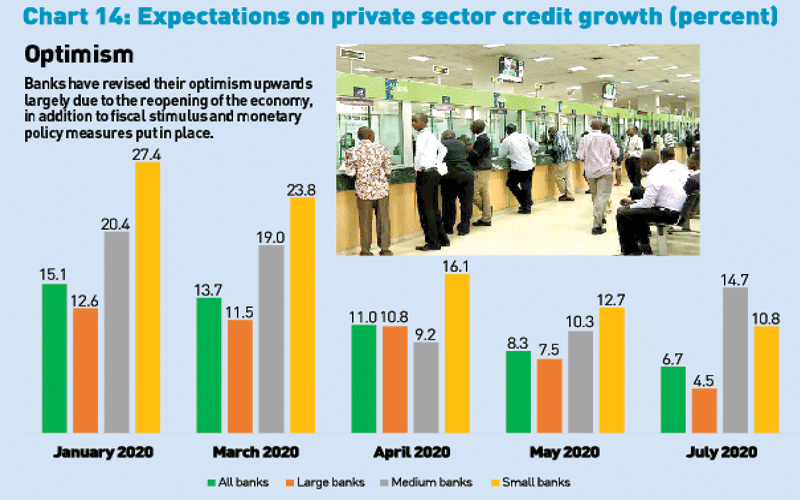Bankers predict increase in credit flow to private sector
By Steve Umidha, August 6, 2020Steve Umidha @UmidhaSteve
Private sector credit growth is expected to expand in the next 30 days and remain so for the remainder of the year, on increased demand by businesses following the gradual re-opening of the economy and increased liquidity of the banking system.
Central Bank of Kenya (CBK)’s Monetary Policy Committee (MPC) survey report says the growth will be significant during August and the last quarter of 2020 as businesses look for credit sources to boost operations – although this will happen at a slower pace.
In the Market Perceptions Survey undertaken last month those interviewed expected a pick-up in demand for credit in July and August due to the opening up of the economy as businesses look up.
However, some respondents indicated that the demand for credit may remain moderate largely due to uncertainties with the rising Covid-19 cases, and credit risk, the report, released yesterday said in part.
The survey, which sampled views from various bank tiers also expects growth to be supported by the government’s interventions to support Micro, Small and Medium Enterprises (MSMEs) from coronavirus pandemic, improved risk profiling, payment of pending bills by national and county governments, as well as favourable weather conditions.
“In addition, anticipated business opportunities from the Big Four- related projects and demand for short-term working capital requirements to meet immediate business needs are expected to support growth in credit to the private sector,” it said.
The pace of private sector credit had slowed to a five-month low before July, as banks cut lending in the wake of the pandemic that has seen borrowers run into financial difficulties and sought repayment extensions –or moratoriums on their loans with their lenders.
Central Bank’s July data shows that credit to the private sector grew by 7.61 per cent in the year to June to record Sh2.69 trillion – the slowest momentum since January when it grew at 7.3 per cent.
In its projection for the month of August, the banking sector regulator expects an enhanced growth because of the revised optimism by most banking institutions.
“Banks have revised their optimism upwards largely due to the reopening of the economy, in addition to the fiscal stimulus and monetary policy measures put in place, soundness and stability of the banking system,” it noted.
Banks had started lending to the private sector at an increasing pace since the removal of the interest rate cap in November last year but that momentum cooled on Covid-19.
In the month of August, banks expect the country’s inflation rate to remain low and stable in the next two months on account of lower food prices following favourable weather conditions, weak demand and expectations of lower international crude oil prices.
Supply chain
In addition, the lifting of restrictions was expected to gradually address the supply chain issues. Respondents expected these factors to more than offset any effects of higher oil prices, supply disruptions.
Similarly, non-bank respondents similarly expected inflation to remain within target in the next two months due to low food and relatively low global oil prices.
The above mentioned expectations, the report notes, is pegged on the ability of Kenya and other world economies to flatten the Covid-19 curve through the containment measures deployed, as well as potential discovery of vaccines and treatments.
On the flipside, pressure could be seen on the inflation from the recent increase in pump prices, a weaker shilling, and progressive recovery of economic activity, according to lending institutions.
In addition, respondents expected some pressure on inflation to arise from the tax measures during financial fear 2020/21, which would ultimately see the increased costs passed to consumers.
Kenya cut its gross domestic product (GDP) growth forecast for this year to about 2.5 per cent due to the pandemic, from an initial 6 per cent.
On how the business environment could be enhanced going forward. Bank respondents indicated that continued settlement of pending bills will spur economic activity and lower non-performing loans, while improved digital security, and increased effectiveness in the Judicial System on contract enforcement would improve their business environment.
Other suggestions included implementation of guarantee schemes
for vulnerable borrowers, Value Added Tax (VAT) refunds to assist businesses with managing their cash flow and provision of a business stabilisation fund to mitigate the impact of Covid-19 especially for MSMEs.
Non-bank private firms on the other hand suggested more support to the MSMEs segment, and the need to provide incentives to the tourism industry to reduce the cost of doing business so that there would be reasonable rates to attract domestic tourists and still break even.
